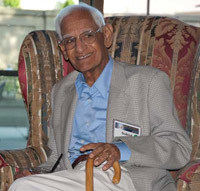Biochemist Har Gobind Khorana, whose UW work earned the Nobel Prize, dies
Biochemist Har Gobind Khorana, who received the Nobel Prize for research he conducted while at the University of Wisconsin–Madison, died Wednesday, Nov. 9 in Concord, Mass. at age 89.

Biochemist Har Gobind Khorana, pictured in 2009.
“He revolutionized biotechnology with his pioneering work in DNA chemistry,” says Aseem Ansari, UW–Madison professor of biochemistry. “The work that he did in Wisconsin from 1960 to 1970 continues to propel new scientific discoveries and major advances.”
Khorana came to Madison in 1960 to serve as co-director of the UW Institute for Enzyme Research and a member of the Department of Biochemistry.
It was at Wisconsin that he and colleagues discovered the mechanisms by which RNA codes for the synthesis of proteins. This work led to the Nobel Prize for physiology or medicine in 1968, which he shared with Robert Holley of Cornell University and Marshall Nirenberg of the National Institutes of Health.
In 1970, shortly after he left Madison to join the faculty of the Massachusetts Institute of Technology, Khorana and colleagues announced that they had synthesized two genes crucial to protein building-work also accomplished at UW–Madison. In 1976, they completed the synthesis of the first fully functional manmade gene in a living cell. The technique they pioneered laid the groundwork for subsequent research on how the structure of a gene influences its function.
Khorana returned to Wisconsin for the last time in 2009 for a symposium held in his honor. Speakers included three Nobel laureates in addition to Khorana, recipients of the Lasker Award (often called the “American Nobel”) and the National Medal of Science and many other world-renowned scientists.
“It was an unbelievable gathering of scientific intelligentsia, and they all came to pay tribute to him,” recalls Ansari, who helped organize the event. “They described how his work had influenced their thinking and the current advances being made in exciting world of synthetic biology.”
Khorana’s impressive career had humble beginnings. He was born in India in 1922, in a small village in the region of Punjab that is now part of Pakistan.
In an autobiographical note written upon winning the Nobel Prize, Khorana wrote: “Although poor, my father was dedicated to educating his children and we were practically the only literate family in the village inhabited by about 100 people.”
Khorana’s daughter, Julia Khorana, in a statement released by MIT, says that her father loved mentoring young scientists.
“Even while doing all this research, he was always really interested in education, in students and young people,” she says. “After he retired, students would come to visit and he loved to talk to them about the work they were doing. He was very loyal to them, and they were very loyal to him, too.”
Inspired by Khorana’s story, in 2007, UW–Madison faculty members Ansari and Ken Shapiro established the Khorana Scholars Program to enable the exchange of top students between select Indian research institutions and the UW–Madison. The program has recently expanded to include students from other midwestern universities as well as MIT, Harvard and some West Coast schools.
The program also sends Wisconsin agricultural scientists to India to assist in entrepreneurial efforts to improve economic stability and food security in poor rural areas. Ansari says there’s no more appropriate way to honor Khorana.
“He served as an icon for why international programs are so important,” Ansari says. “He personified the Wisconsin Idea, the idea of knowledge without boundaries. Here was a man who came from a poor rural Indian family, working in Wisconsin, making a contribution that changed the course of science.”




